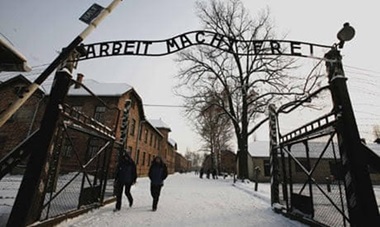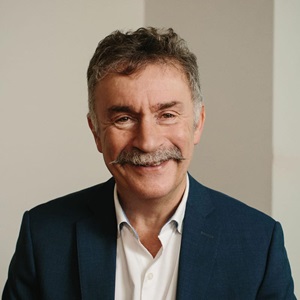
Visiting Auschwitz (Oświęcim) made a profound impression on Peter Mogan.
It has been the topic of countless publications that our world, at least in the Global North, is very polarized and becoming even more so. Because of that, there is a parallel trend to politicize a greater and greater share of everyday life (vaccines, masks and immigration, to name but a few).
The most prevalent explanation for this phenomenon is the ‘echo chamber’ effect, which can result from the personalization of external sources of information, including mainstream and social media. Sophisticated algorithms in our digital life learn our preferences and push curated content to us that is intended to move us along the political continuum towards extremes on both ends.
As we are all susceptible to confirmation bias, we seek information to confirm our points of view. Neuroscientists point out that our cognition is ‘lazy’ and it is far easier for our minds – which continually are seeking to make sense of an increasingly complex world – to confirm what is familiar than to face challenge and be forced to consider a new way of looking at things1.
Two effects of increasing polarization and politicization in our world deeply disturb me. Those effects – demonization and self-righteousness – are two sides of the same coin.
Demonization
There was a time, not so long ago, when we had the ability to disagree in a civil manner. Just 50 years ago, we saw the rise of pluralism, where ideas competed for the attention and influence in the public arena. This was seen by most commentators and theorists as a good thing, because our society would grow broader and deeper in its thinking and understanding through such an open exchange of viewpoints.
To hold differing perspectives did not, at least in the political arena, necessarily result in animosity towards the ideological adversary. Rather, the whole notion of pluralism was broad acceptance and, at least, tolerance.
Sadly, most of our society and our political and academic institutions have lost this dialogical capacity. Rather, increasingly, those who hold conservative, traditional mindsets tend to see progressives as flawed, and even evil. Those on the political left, return the favour.
This widespread demonization of the political, social ‘other’ means that minds are closed, ears are plugged, curiosity is stifled and we move to extremes. Our political systems no longer are collaborative. Political foes rarely go for a beer with each other after a debate as they used to. And, if they do, they risk backlash from their supporters, including the possibility of being ‘cancelled.’
Universities, which used to celebrate diverse perspectives, increasingly are subject to political scrutiny from their students and media on the right side and left side of the spectrum2. Demonization of the other exacts a high emotional and social toll.
Self-righteousness
On the flip side of demonization is self-righteousness. We identify with our ideological tribe and feel virtuous for doing so. We are right and they are wrong. We are good people; they are bad people.
A part of the human condition is a deep insecurity that asks the question: “Am I enough?”3. A common strategy to affirm our inherent value and combat shame is to ‘other.’ I lift myself up by putting you down. I signal to my ‘tribe’ that I am virtuous (hence the somewhat pejorative term ‘virtue signaling’).
This takes many forms on both sides of the socio-political divide: the use of language, tribal heroes I identify with, those I demonize, what clothes I wear, what brands I support and which I avoid; the list goes on and on. And to remain in good standing with my tribe, I move more and more to the extreme, with a deep sense of self-righteousness as I do so.
Revelation at Auschwitz
A fundamental problem I see in all this is that we come to believe that the world is made up of good people and bad people. I believe that this is fundamentally untrue. Why? Let me share a part of my story.
Many of my relatives – Hungarian Jews, including my paternal grandmother – were deported and murdered in Auschwitz and Birkenau. With that knowledge, about 25 years ago, I went to visit Oświęcim (the Polish name for Auschwitz) about 30 kilometres outside of Krakow. It was a cold, gray, drizzly November day.
My friend Tom and I latched on to a tour group with a young Polish guide who had impeccable English. She was passionate as she took us through the grounds, which were well preserved, and described the horrors of what had taken place there 50 years earlier.
We started at the railway siding, where most of those who survived the tortuous journey were stripped naked and led to the “‘showers’ for ‘disinfection.’ There they were killed by the hundreds – poisoned to death with hydrogen cyanide gas. After being killed, all of their possessions, including their dental work and even their hair, were removed and taken away. A few of the fittest were allowed to live to serve as slaves or as subjects of the infamous Nazi medical experiments. Survivors were treated like animals.
We toured the camp buildings that had been converted into display rooms: one for jewelry, one for luggage, one for shaving implements, even a room full of human hair. We saw long lists of names showing the date each arrived and the date of death. By the time we got to the feeding troughs, I felt nauseous and a weight pressing down on me. I excused myself and went to be alone in the area where people had been shot by firing squads.
No one is righteous
It was there that I had one of the most profound spiritual and learning experiences of my life.
As a descendant, I wanted to identify with the victims of this horrible place. Yet I came to know in my heart – like a whisper from God – that I also would be capable of being a perpetrator. I saw clearly for the first time that the line between good and evil runs right down the middle of me and every fellow human.
Since that powerful event, I have lived with the conviction that I must always choose the path of love, grace and justice and resist the strong pull of the darkness that can overtake me. It would be dangerous to consider myself righteous. And dangerous to see anyone else as wholly evil even when they commit the most heinous of wrongs.
That is why I believe that the binary practice of categorizing people as good or evil is so fundamentally flawed and dangerous. I hope and pray that our world will find a new way – a third way – forward that rejects the lure of self-righteousness and the demonization of others; a third way that recovers the human ability to not just tolerate but to embrace the one with whom we disagree, even passionately so. Anything less risks the collapse of our culture.
1 For a rich and fulsome explanation of how cognitive bias and other heuristics fool our brains, I would recommend Thinking Fast and Slow by Daniel Kahneman.
2 The termination of Claudine Gay from her post as President of Harvard University is a recent example of this.
3 Brené Brown explains this at length in several of her best selling books including I Thought it was Just Me. Our underlying insecurity is the source of shame, a message that tells us we are ‘less than.’

Peter Mogan
Peter Mogan has been active as a lawyer, corporate director, businessman and mediator in BC and Ontario since 1978. He has worked closely with his business clients and boards as a strategic advisor – bringing a practical, entrepreneurial approach, combined with a very relational style.
Peter’s primary role at the present time is in corporate governance. He serves as Board Chair of five boards including Nexii Building Solutions, Amicus Global Relief Solutions, Mission Group Enterprises and Wrkout Media, and as Vice Chair of the international board of Food for the Hungry. He also is Chair of a MacKay CEO Forum Group.
He is also Moderator of the Lead Team of Artisan Church.

Thank you, Peter, what a timely and needed article – and, in my mind, essential for our very survival. Your own story really gutted me and brought tears to my eyes. Thank you for the excellent resources too.
I have found two books particularly helpful in this conversation:
1) The Righteous Mind: Why Good People are Divided by Politics and Religion, by Jonathan Haidt, who finds great virtue on both the left and the right, and
2) Exclusion and Embrace: A Theological Exploration of Identity, Otherness and Reconciliation, by Miroslav Volf, whose call for a third way was undoubtedly influenced by his experience of the deep binary divisions of the Balkan war.
Thank you so much for your timely words and the spirit and grace in which they are written.